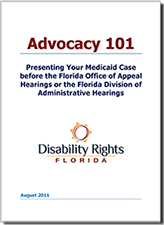Disability Resources by Category
Advocacy 101 - Challenging an Agency’s Denial or Reduction of Your Medicaid Services
 This Disability Topic and the related e-booklet titled Advocacy 101 both explain the steps required to challenge a denial or reduction of a Medicaid State Plan or Medicaid Waiver service. Medicaid services are provided through the Medicaid State Plan and various home and community-based services programs called Medicaid Waivers.
This Disability Topic and the related e-booklet titled Advocacy 101 both explain the steps required to challenge a denial or reduction of a Medicaid State Plan or Medicaid Waiver service. Medicaid services are provided through the Medicaid State Plan and various home and community-based services programs called Medicaid Waivers.
The tabs below are a condensed version for easy reference. If you would like more information, please download Advocacy 101, the comprehensive e-booklet from Disability Rights Florida.
Please also view our Advocacy 101 Webinar, available on our Trainings and Presentations page.
Notice & Appeal
As a person with disabilities, you have a legal right to both Notice of and Appeal from an agency or Medicaid managed care companies' decision to reduce or deny your Medicaid services.
These appeals first occurs within the Medicaid managed care companies’ Plan appeal process, or, if not in a Plan, administrative hearings conducted by the Agency for Health Care Administration’s Office of Fair Hearing (OFH) or the Department of Children and Families’ Office of Appeals Hearings (OAH). This is explained in detail on our Advocacy 101 ebook.
The person whose Medicaid services were reduced or denied is called the Petitioner.
The letter denying or reducing your services is called a Denial Notice, or if you’ve exhausted your Medicaid managed care Plan’s appeal process, a Notice of Plan Appeal Resolution (NPAR), and it is your guide to requesting a Medicaid fair hearing. The Denial Notice or NPAR should contain the reason for denial/reduction, specific services denied or reduced, how you can challenge this, the deadlines for doing so, and contact names and addresses.
Petition
The Denial Notice includes the deadline for requesting a hearing.
Specifically, the notice will give the number of days from the date of the notice that the Petitioner has to request a hearing.
Generally, if you want to continue receiving preexisting services until the date of the hearing, you must request a hearing within 10 days from the date of the Denial Notice or within the timeframe specified in your Denial Notice/NPAR. However, if you have requested a new service that the agency has denied, you cannot receive that service during the appeals process.
The request for a hearing generally should be made in writing. This written request for a hearing is called a Petition.
Send your written request for a hearing directly to the agency at the address given in the Denial Notice/NPAR.
Assignment
The agency will forward your Petition to the Office of Fair Hearing (OFH) or the Office of Appeal Hearings (OAH), and your case will be assigned to a hearing officer who will preside over your hearing.
You will receive a letter that includes the hearing officer’s name and contact information, the name of the agency representative assigned to your case, and your case number. Keep this letter for your reference.
Hearing Notice
The hearing officer will send a Notice of Hearing to you, providing the date, time, duration, and location of the hearing.
You have a right to be present at a hearing either in person or telephonically. If the Notice of Hearing indicates one and you prefer the other, communicate that to your hearing officer as soon as possible.
Record the date, time, and place of the hearing and share that information with your witnesses.
If you cannot attend the scheduled hearing because of an emergency, you may request a continuance. A continuance means that a hearing is rescheduled for a later date.
If you need a continuance, you should submit your request to the hearing officer and send a copy to the agency at least 5 days before the scheduled hearing.
Do not assume that the hearing officer granted the continuance if you have not received an order granting a continuance. If you have not received an order, contact the hearing officer’s assistant to find out the status of your request.
Collecting Information
Start preparing for the hearing as soon as you request it. Collect information through documents, witnesses and discovery.
Thoroughly review the Denial Notice and notice the reason(s) that the agency or Plan gave for denying or reducing the Petitioner’s services. During the hearing, your focus will be presenting documents and witness testimony to prove that the agency’s or Plan's reason(s) for denying or reducing the services were wrong.
Research the laws and administrative rules that apply to your case. Remember that the hearing officer has to base her or his decision on the applicable law. Visit the Links tab where links to many of the major laws and rules are provided.
Compile all the documents that you believe will support your need for the services; this includes medical records, information from service providers, support plans, or any other relevant information.
Formally preparing for the hearing is a process called discovery. During discovery, both you and the agency exchange information that is going to be included in your hearing. Discovery allows you to request from the agency your file and any documents the agency considered to make its decision. Conversely, if the agency requests information from you, you must respond to the agency’s request within 30 days of receiving it.
Preparing
The more organized and prepared you are for the hearing, the more smoothly you will present your case and the less nervous you will feel during the hearing.
During the hearing, you may present documents, charts, photos and other evidence known as exhibits. Before the hearing date, both you and the agency will send an exhibit list to each other and the presiding officer.
Both you and the agency may have witnesses testify at your hearing, and you and the agency must provide each other and the hearing officer a list of all witnesses and their contact information before the hearing date. Your witnesses should be people who have direct contact with you or the Petitioner, including family members, doctors, or service providers who personally know about your disability, how it impacts your ability to perform daily activities and your need for services. Make sure to give your witnesses the date, time, and location of the hearing and make sure they can be at the location at that time.
Before the hearing, practice asking your witnesses questions to make them more familiar with what to expect at the hearing and also to let you know what their answers are likely to be.
The Hearing
An administrative hearing is less formal than a trial.
The hearing officer will guide you through the process, and you should ask any appropriate questions. If you are not sure, ask the hearing officer politely if you may speak or ask a question.
In a hearing, the party with the burden of proof presents its version of the case first by examining witnesses and exhibits. If the agency has the burden of proof, the agency first asks questions of its own witnesses—this is called direct examination. At the end of the first party’s presentation, the other party presents its case.
During the hearing, you should carefully listen to the agency’s questions and the witnesses’ answers. You may take notes, if appropriate, because after the agency finishes questioning its witnesses, you will have an opportunity to question each witness.
The presiding officer also may question either party’s witnesses.
Either side can object to questions asked by the other party. Direct your objection to the hearing officer and state plainly why you think the question is inappropriate.
Do not become combative or argue with witnesses, the agency representative or the hearing officer.
At the end of the hearing, the hearing officer will not immediately make a decision. Instead, the hearing officer has a specific amount of time after the hearing to issue a written decision.
Recommended & Final Orders
The hearing officer’s written decision will be called either a Final Order or Recommended Order with findings of fact and conclusions of law. If the hearing officer finds that the agency’s decision was wrong, the Order also will include a remedy.
If the hearing officer files a Recommended Order, the agency that issued the initial determination from which you are appealing will then draft a Final Order which either accepts or rejects the hearing officer’s rulings.
If the final decision is not in your favor, within 30 days of the date of the final order you have the right to appeal this decision to an appropriate District Court of Appeal.
Links
Visit these websites for more information and resources: Florida Statutes and Rules
- Florida Statute Chapter 90 - Evidence Code
- Florida Statute Chapter 119 - Public Records
- Florida Statute Chapter 120.569 - Decisions Which Affect Substantial Interests
- Florida Statute Chapter 120.57 - Additional Procedures for Particular Casees
- Florida Statute Chapter 393 - Developmental Disabilities
- Florida Rules of Civil Procedure
- Florida Administrative Code Chapter 28-106 - Decisions Determining Substantial Interests
- Florida Administrative Code Chapter 59G - Medicaid
- Florida Medicaid Coverage and Limitations Provider Handbooks
Federal Regulations
Florida Agencies
- Agency for Persons with Disabilities
- Agency for Health Care Administration
- Florida Medicaid
- Department of Children and Families
- ConsumerDirected Care Plus
- Children’s Medical Services
- Division of Administrative Hearings
Federal Agencies
- Social Security
- Center for Medicare and Medicaid Services, United States Department of Health and Human Service
Other Resources
